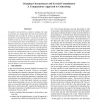Free Online Productivity Tools
i2Speak
i2Symbol
i2OCR
iTex2Img
iWeb2Print
iWeb2Shot
i2Type
iPdf2Split
iPdf2Merge
i2Bopomofo
i2Arabic
i2Style
i2Image
i2PDF
iLatex2Rtf
Sci2ools
WECWIS
2007
IEEE
2007
IEEE
Changing Circumstances and Leveled Commitment: A Compensatory Approach to Contracting
In dynamic and uncertain e-commerce settings, the value of contracts can change after they have been entered into. Sometimes this can make the contract in question counterproductive to the affected parties. Given this, leveled commitment contracts, in which one agent pays the other a fee to be released from their decommitment, are widely used. However, these fees are often seen only as a deterrent of decommitment and the fact that the decommitment also affects the other party and the society in general is usually ignored. This paper investigates an alternative view, coming from law, that sees the decommitment fees as a means of compensating the victim for their loss. Moreover, we show that these compensatory policies can outperform their traditional noncompensatory counterparts in terms of total utility (the sum of all agent’s utilities) in situations in which the utility of one of the parties decreases after the contract has been entered into, but before it is due to be performed.
| Added | 04 Jun 2010 |
| Updated | 04 Jun 2010 |
| Type | Conference |
| Year | 2007 |
| Where | WECWIS |
| Authors | Ilja Ponka, Nicholas R. Jennings |
Comments (0)

